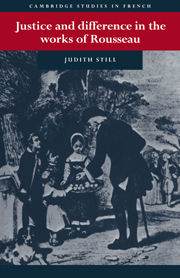Book contents
- Frontmatter
- Contents
- Acknowledgements
- A preliminary note on vocabulary and conventions
- Introduction
- Chapter 1 The problem: the intersection of beneficence and pudicity
- Chapter 2 The code of beneficence
- Chapter 3 The practice of beneficence and model benefactors in the major works
- Chapter 4 The passion of pity in Rousseau's theory of man
- Chapter 5 Gyges' ring: a reading of Rousseau's 6e Promenade
- Chapter 6 Pudicity in some of Rousseau's minor writings: its relationship to beneficence
- Conclusion
- Appendix: Generosity and pudicity in Gyges und sein Ring and Le Roi Candaule
- Notes
- Bibliography
- Index
- Cambridge Studies in French
Chapter 4 - The passion of pity in Rousseau's theory of man
Published online by Cambridge University Press: 22 September 2009
- Frontmatter
- Contents
- Acknowledgements
- A preliminary note on vocabulary and conventions
- Introduction
- Chapter 1 The problem: the intersection of beneficence and pudicity
- Chapter 2 The code of beneficence
- Chapter 3 The practice of beneficence and model benefactors in the major works
- Chapter 4 The passion of pity in Rousseau's theory of man
- Chapter 5 Gyges' ring: a reading of Rousseau's 6e Promenade
- Chapter 6 Pudicity in some of Rousseau's minor writings: its relationship to beneficence
- Conclusion
- Appendix: Generosity and pudicity in Gyges und sein Ring and Le Roi Candaule
- Notes
- Bibliography
- Index
- Cambridge Studies in French
Summary
According to Rousseau's theory of human nature, rational codes would be of little avail were man not in some way inspired by his passions to follow them. It is, therefore, crucial to look closely at the passion which prompts the true benefactor; this passion is pity, an extension of amour de soi. Pity works for the good of mankind not only by inspiring beneficence, but also by channelling energy away from amorous passion. Both pity and amorous passion are forms of self-love directed onto the other. Both are originally general emotions which, in society, have specific objects, and both should, in different ways, work to preserve humanity. Yet there is a violence in amorous passion which necessitates its being rigorously curbed in society by another social code, that is pudicity. Pudicity, according to Rousseau, serves to protect the social cohesion which beneficence promotes. Yet pity is closely related to amorous passion; both are awakened by the imagination, which is itself aroused by a spectacle, an object which could be either pathetic or erotic or, more dangerously, could evoke both pity and desire. This fact will clearly have implications for beneficence.
THE RELATION OF PASSIONS TO REASONED BEHAVIOUR
Rousseau does not simply import the classical code of beneficence into his thinking, and leave it unassimilated like a foreign body. He integrates what he has appropriated, reshaping it in terms of his account of human nature.
- Type
- Chapter
- Information
- Justice and Difference in the Works of RousseauBienfaisance and Pudeur, pp. 82 - 107Publisher: Cambridge University PressPrint publication year: 1993



